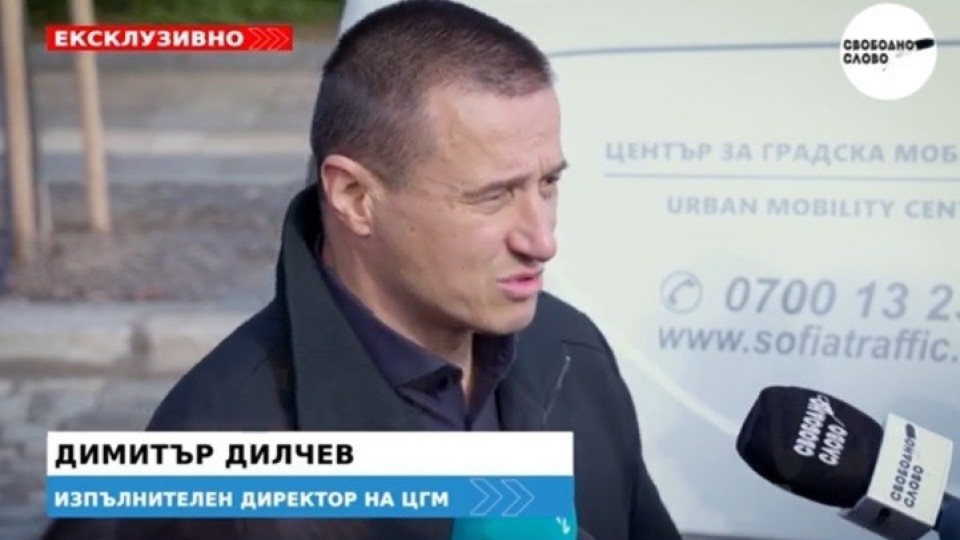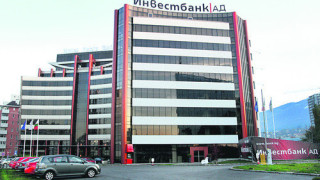Digital revolution is going to change Sofia parking and specially equipped vehicles are going to take informed decisions for introducing flexible parking policies. That is what Dimitar Dilchev, executive director of Urban Mobility Center (UMC) has shared in front of ‘Svobodno slowo’ journalist Anelia Duleva and cameraman Simeon Krushkov. He has added that this is the first parking control vehicle in the capital city that already works in a text mode and goes around the paid parking area. Inside the car a display is showing how every vehicle is being checked if there is an SMS sent, at what time it expires and if there is a payment for the paid zone at all.
Today, the Urban Mobility Center conducted a unique demonstration for the residents and guests of Sofia of the first equipped vehicle (Park Patrol) for parking control under the project "Digitization of existing services and provision of new digital services for collection, processing, analysis, exchange, and visualization of data for management and control of parking of motor vehicles in designated parking spaces on the territory of Sofia Municipality." It is implemented by the Consortium "Smart Parking Solution," in which the companies "Upass" AD, represented by Andrey Lilov, and "West Auto Digital," represented by Nikolay Mitev, participate. They personally presented and demonstrated some of the impressive features of the high-tech machine.
Andrey Lilov, a representative of the consortium, explained that at a speed of around 30 km/h, the vehicle can check about four thousand cars within one hour. According to him, the innovation lies not only in the equipment of the vehicle but also in the mounting of the cameras, which are attached with magnets. This way, they can be easily replaced in case of necessary maintenance or repair, Lilov further explained.

He further explained that the systems in this vehicle also allow for the placement of a "digital clamp," but this requires a decision from the Sofia Municipal Council (SMC). This way, it will be possible to "clamp" the vehicle at the moment of the violation. We also have new devices for monitoring control, which will be able to issue digital permits, but for now, paper ones remain because this also needs to be resolved by the SMC, Lilov pointed out.
The attendees had the opportunity to examine and test in a real environment the first of the field vehicles, equipped as Park Patrols by the Urban Mobility Center for parking control, to learn more about the project's goals and the possibilities that its implementation will provide in the hands of the Sofia Municipality for creating and implementing flexible policies based on real data and analyses regarding parking throughout the city.

"The system provides opportunities for introducing, for example, electronic stickers by districts and paid parking for all outside the district. Based on analyses, one can also consider introducing fair payment in the central urban area. Alternatively, a night zone could be introduced on nights with heavy parking demand in areas with many bars and nightclubs. Or the introduction of short-term parking spaces near institutions," Dilchev explained. According to him, part of the new system to be used includes license plate recognition cameras. Additional paid parking spaces, even private ones, can be added to the system. Integration with external systems and services, such as low-emission zones, can also be provided upon request, allowing for the application of different parking access rules in the zones, among other things.

"The system offers the possibility of introducing, for example, electronic stickers by regions and paid parking for all outside of those regions. Based on analyses, one can also consider implementing fair payment in the central urban area. Alternatively, a night zone could be established on nights with heavy parking demand in areas with many bars and nightclubs. Or the introduction of short-term parking spaces near institutions," Dilchev explained. According to him, part of the new system to be used includes license plate recognition cameras. Additional paid parking spots, even private ones, can be integrated into the system. Upon request, integration with external systems and services, such as low-emission zones, can also be provided, allowing for the implementation of different parking access rules in the zones, among other things."

"The project has no equivalent in Bulgaria. The huge number of cars, over 1,000,000, combined with the extensive coverage of paid parking zones and available parking spaces, necessitates the implementation of an integrated approach for control and provision of services for Sofia residents. Digitization of parking is a step in the right direction, which will contribute to more efficient and modern management of parking in the Sofia Municipality.
The Urban Mobility Center will also be equipped with cameras that will catch violators in real time. This is part of the new system that will unify and digitize all services of the company. It is expected to be operational by May."

The new system also includes a unified online user profile through which all services of the Urban Mobility Center (UMC) can be paid for at a "virtual counter." In addition to paying for parking zones, documents for electronic residential stickers or for a "Service Subscription" can be submitted through integration with the Secure Delivery System and the Electronic Authentication System.
Everyone will be able to create a customer profile where they can add their payment card for service payments and receive notifications when they expire. Thus, from their profile, they can pay for a clamped vehicle and for reissuing an electronic residential sticker.

A new unified mobile application for iOS and Android is also part of the conveniences that will facilitate citizens in parking services. Through it, information can be obtained on the locations of municipal and buffer parking lots, as well as the availability of spaces in them.
Digital parking services will gradually be linked to the unified public transport system, allowing all services to be combined.
The integration of systems will allow for payment through the application for the "Park and Ride" service.
However, one of the biggest changes is the equipping of Urban Mobility Center vehicles with four license plate recognition cameras. This will enable them to capture both parallel and perpendicular parked vehicles. The software will be managed by an onboard device in the vehicle. The car will be connected to the UMC control center, where information about improperly parked vehicles will be automatically received, and teams will be able to clamp improperly parked vehicles or tow them from the center.
The system will automatically distinguish vehicles with residential parking stickers or with a service or special subscription.
A similar modern and integrated parking solution is already functioning in Amsterdam. The Sofia system will be the first in the Balkans.
Currently, control in paid parking zones is done manually by inspectors. Physically patrolling the zones is an expensive and time-consuming solution. New modern devices are planned for inspectors, equipped with automatic license plate recognition.
Their introduction will provide a much more efficient method for managing paid parking.
This is an intelligent technology developed using artificial intelligence, used in "smart" parking management systems.
It helps not only in catching violators but also in better planning of mobile patrol routes during peak hours, allowing for a large part of the paid zone to be covered in a short time.
The devices will also have a panic button to increase the security of inspectors in cases of disputes with fine violators.
The data collected can be used to analyze peak-hour zones, and in the future, to improve urban traffic by redirecting drivers to areas with more available spaces. Parking patrols can collect real-time information on parking occupancy and availability.
For this purpose, however, infrastructure for marking, numbering, and delineating parking spaces and paid zones must be built to track their status. This way, through their mobile application, for example, drivers could see where there are available spaces, instead of circling the city center. This could reduce harmful emissions and improve urban traffic in the future by directing drivers to areas with more available spaces.
Vehicles equipped with automated license plate recognition have the capacity to monitor over 150,000 spaces, which allows for a massive expansion of parking control in Sofia. Digital services can be further developed and modified if the Sofia Municipal Council decides to change the rules.
The accumulated information from the system can be used to analyze and propose solutions based on the collected data. The introduction of digital services will not eliminate the use of paper parking permits at this stage, nor will it make physical patrols unnecessary. Sofians will still be able to place a permit on their dashboard as before, and parking inspectors will check in an integrated system that combines data from the vehicle and physical patrols.
Digitizing services will enable the introduction of a fully electronic permit in the future, which will stop the practice of parking for longer than the maximum time. In addition, if the Sofia Municipal Council decides and there is a legislative change, virtual clamping may also be imposed.
Collecting parking data throughout the city, both in parking zones and beyond, allows for analysis and informed decision-making when introducing new, flexible parking policies.
This is the first project in Bulgaria and the Balkans for the digitization of all parking services on such a scale and with such capabilities. In addition to the direct benefits for Sofia Municipality such as improving control over offered parking services, introducing new services, increasing the efficiency of processes and control teams, minimizing violations, and increasing parking revenues.









Leave a comment